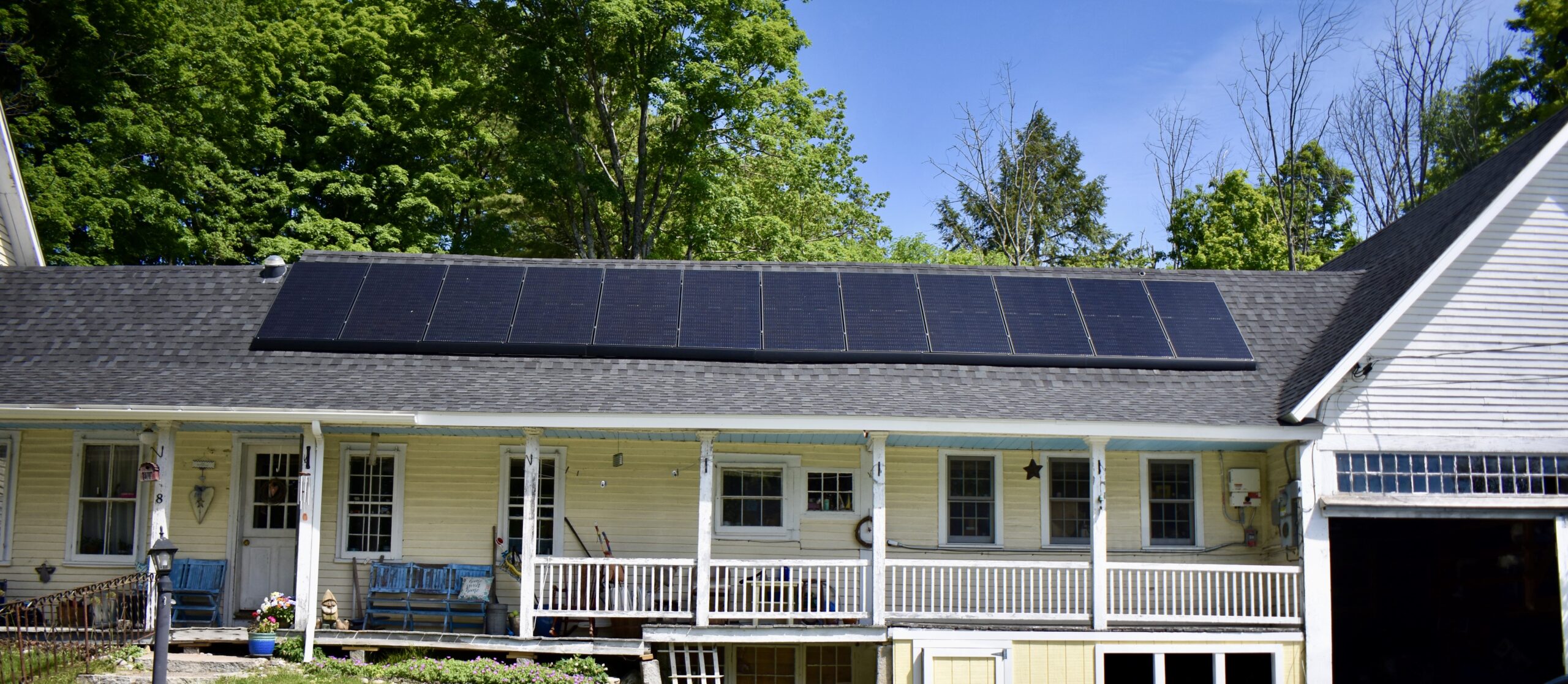
FAQs

Is solar worth the investment in New England?
Absolutely. Although we don’t have as much sunlight as other parts of the country, we still have plenty of sunshine to make it worth the investment. Two other factors add to the benefits of solar energy in New England: 1) We have some of the highest electricity prices in the country, which means that you will see a return on investment sooner than in other states. 2) Heat negatively affects solar power production so our cooler temperatures in New England help the system run more efficiently.
How long will it take to payback my project cost?
Your specific return on investment (ROI) will vary depending on multiple factors such as the orientation of your roof, available sunlight, and if you took out a loan with interest to finance the build. Most residential customers break even around 7-10 years into the 30-year lifespan of the project. Savings add up quickly after the ROI. Included in our free quote is a detailed estimate of your personal ROI.
What tax incentives are available for solar customers?
The Federal Residential Solar Energy Credit is available until 2032. It will cover 30% of the cost of the solar installation as a tax credit for residents who owe income tax. New Hampshire also has a reimbursement program for up to $1000 off the total price, but the program is not always available based on state funding. Peak solar is not a tax advisor so please refer to https://www.energy.gov/eere/solar/homeowners-guide-federal-tax-credit-solar-photovoltaics for further details.
Do I need to have a south facing roof?
Not at all. 20 years ago, that may have been true, but solar panel prices have decreased and their efficiency has increased which makes putting them on East or West facing roofs a viable option. South facing roofs are the ideal location, but we can work with your property to find solutions if you don’t have a south facing roof. If no area of your roof is viable or you do not like the aesthetic of solar on the roof, we can also design a ground mount system.
Does my roof need to be new to install solar panels?
No, the roof does not need to be new but the solar systems we sell, and install are warrantied for 25 years and designed to last 30+ years. Since solar has no moving parts, the systems can last for decades without any maintenance requirements. If your roof is getting towards the end of its lifespan or starting to deteriorate, we recommend reroofing before installing solar or choosing a ground mount option. We can also help extend the life of shingle roofs with a sealant coating to help them last an estimated additional 5 years.
How many panels will I need?
The number of panels needed is highly variable based on consumption of the property, available sunlight, and how much of your bill you want to cover. Most standard residential houses have between 5-10kW (kiloWatts) of solar installed which translates roughly to about 15-30 panels. Homes with new energy efficient features like heat pumps and electric car chargers generally install 10-20kW to cover all their usage, translating to 30-60 panels. In New Hampshire you are allowed to install up to 99kW at a residence which can potentially earn you money from your local utility company. We will help you decide how much you need or want during a free quote.
Do I need a battery?
A battery isn’t needed for a solar system to work but they can be a welcome addition. If the power goes out, the solar system is designed to safely shut down until the utility company restores power. If you need or want power during an outage, a battery backup would be necessary to keep the lights on and keep the solar system working. Batteries now qualify for the 30% federal tax credit so they may make more financial sense than adding a hardwired onsite generator. We can help you make the right decision on including a battery. Our promise is to help you get the best product for you and your family, not to try to up-sell if batteries are not needed.
Do I need to go off grid?
Absolutely not. The grid is a valuable resource that supplies power during the times that the solar panels won’t be functioning (i.e. at night). In New Hampshire we pay a base rate of $12-15 per month to be connected to the grid which can be offset by credits (see FAQ about Net Metering below). Going off grid is a great solution for rural properties where the grid is too far away or is cost prohibitive to connect to.
Will I have an electric bill after the project?
That depends on how many solar panels you install. Most residents will choose a system that covers 90-110% of their bill throughout the year. In months like December and January you may owe money on your bill due to the lack of sunlight, but this cost can be fully offset if your solar system produces a sufficient surplus during sunny months. Some residents may only be able to fit a limited number of panels which may mean only covering 50-90% of a bill. The solar system and Net metering will work the same way; however, you would likely still receive a bill each month. Some residents chose large systems that can cover much more than their current bill. It is possible to bank so many credits that the utility company is obliged to pay you! Factoring in possible future electrical loads such as heat pumps and electric car charging is something to consider when choosing what size to install.
What is Net Metering?
Net Metering is a program that records all the imports (kWh you take from the grid) and exports (surplus kWh after your electrical needs are covered that you send out onto the grid) and bills you accordingly. Here in New Hampshire, we have an excellent Net Metering program where the Utilities (Eversource, Unitil, NHEC, Liberty) will credit your account for every kwh you send back onto the grid. The exact formula is complex, so we like to say that for every dollar you spend on electricity you get about 80 cents back when you export power. During sunny months like April, May, and June you will probably bank up quite a bit of extra credits with your power company which they will then use to cover your bill later in the year when there is less sun. Overall, it is possible to export enough energy over the course of a year to erase your bill entirely (or even earn enough credits that the power company will write you a check!). We can help you understand exactly how much of your bill will be covered during a free quote.
Can the solar panels be used to charge my electric car?
Yes. If you don’t have a battery backup, then the power you produce during the day will cover all the loads in your house, including electric car charging. If your solar system doesn’t provide enough power, you will also import power from the grid. If you are producing more than what you are using in the house, then you will export the excess back onto the grid for credits. Once the sun sets and the solar system turns off for the night, any electricity usage would come solely from the grid. If you chose to install a battery backup, you can extend the time that you are using power from your own solar system past when then solar shuts down for the night. With a large enough battery, it is possible to cover all of your loads entirely and never import any kWh from the grid, although larger batteries can be costly.
Do the solar panels work on cloudy days?
Yes. When solar panels were new to the market, they required full sun to produce energy, but these days panels are much more efficient and new electronics keep each individual panel working at its maximum potential even if other panels have a cloud or a shadow blocking them. Solar can even work on rainy days; the output will just be much lower than clear and sunny days. The only time your panels will not produce energy is when they are covered with snow or when the sun goes down each night.
